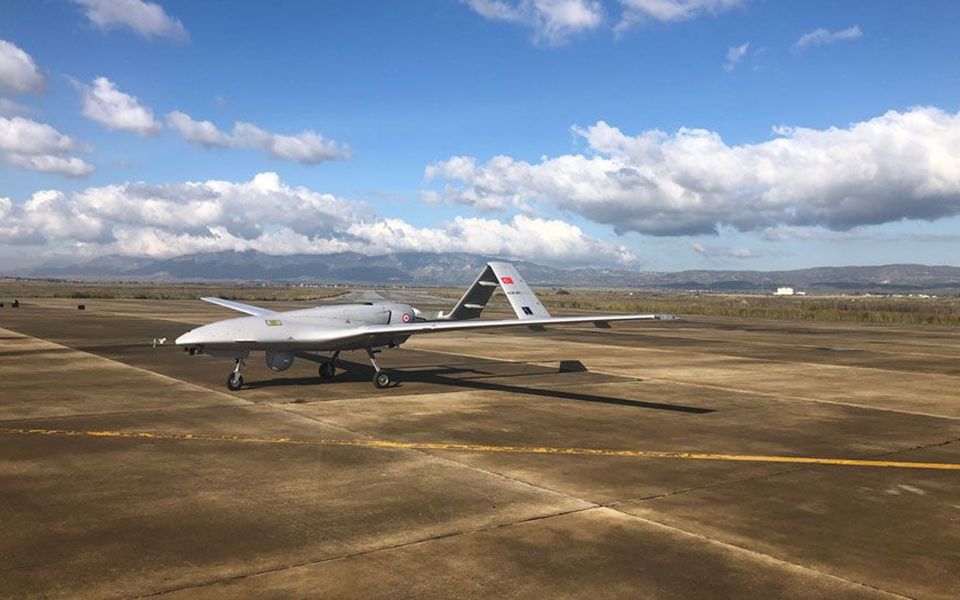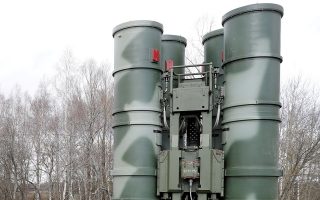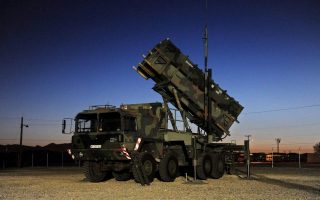Congress presses State Department on Turkey’s drone program

WASHINGTON, DC – 28 members of the House of Representatives, led by Congressmen David Cicilline of Rhode Island and Gus Bilirakis of Florida, wrote to Secretary of State Antony Blinken to “[express] concern over Turkey’s armed unmanned aerial vehicle (UAV) program, which has destabilized multiple regions of the globe and threatens US interests, allies, and partners.”
Over the last two sessions of Congress, both the House of Representatives and the Senate have sent several signals to Ankara that it should not take its once privileged relationship with the American defense industry for granted. The Erdogan government did not take the signals seriously when it came to its purchase of Russia S400s, and Congress then forced Turkey’s removal from the F35 program and the imposition of CAATSA (Countering America’s Adversaries Through Sanctions Act) sanctions.
Now, Congress seems to have Turkey’s drone program in its sight. Just two weeks ago, Senator Robert Menendez questioned Undersecretary of State Victoria Nuland about the program in a full Senate Foreign Relations Committee hearing. Now, members of the House are asking Secretary Blinken for an in-depth briefing.
According to Congressman Cicilline: “We have long given Turkey access to top shelf military technology. It is imperative that American technology is used consistent with American interests, values and alliances. That is why we are asking Secretary Blinken to investigate whether Turkey’s drone program violates American law or destabilizes regions in which we have national security interests.”
Congressman Bilirakis drew a parallel with the controversy that led to CAATSA sanctions on Turkey: “As we did in the case of the F35s and the S400s, Congress has come together in a bipartisan fashion to ensure that American weapons and technology is not being transferred in a way that negatively affects our national security or breaks our laws. Turkey has violated the trust our defense establishment has placed in it, and that is why we would like the Biden Administration to brief us on this killer drone program.”
Since the beginning of the Biden Administration, Turkey has consistently tried to change its image in Washington, DC, hiring additional lobbyists and sending a new ambassador who immediately launched a charm offensive. But as was the case in other policy changes in the Eastern Mediterranean, coalitions of American civic organizations seem to be more than a match for these efforts.
The groups that were at the forefront of the #NoJetsForTurkey and #SanctionTurkey campaigns – the Hellenic American Leadership Council (HALC), the Armenian National Committee of America (ANCA), and In Defense of Christians (IDC) – are now part of an expanded coalition that includes American Friends of Kurdistan, the Hindu American Foundation, and the Middle East Forum pushing for strict scrutiny of Turkey’s drone program.
“Turkey has for too long treated its privileged relationship with the American defense industry as a license to disregard America’s core interests, its values, and its partnerships around the world. Turkey’s drone programs is but the latest way this purported ally threatens American interests – and arguably violates American law,” said HALC’s Executive Director, Endy Zemenides.
Turkish Bayraktar drones deployed by Azerbaijan against Artsakh last fall were discovered to contain at least 10 parts manufactured in the United States. According to ANCA Executive Director Aram Hamparian, “a State Department investigation is long overdue into Turkey’s drone program – with a special focus on the discovery of US parts in the Bayraktar drones deployed by Azerbaijan against the indigenous Armenian population of Artsakh.”
The Hindu American Foundation’s role in this coalition should be noted, as Hindu Americans are increasingly a prominent force in American politics, and because it might signal a Greece-Armenia-India “lobby” within the US that proves to be an increasing thorn to Turkey, Pakistan and Azerbaijan. “Pakistan’s introduction of terror drone warfare in Kashmir last month in an emerging threat to peace and stability in the region and the response from the US and world leaders must be swift,” noted Hindu American Foundation Director of Public Policy Taniel Koushakjian.
The 28 members of Congress criticized Turkey’s use of drones against Kurds partnership with US forces against ISIS, prompting Diliman Abdulkader – the spokesman for American Friends of Kurdistan – to declare: “The Turkish regime continues to use NATO as a shield while using its drone program to target our allies and partners in the region.”
In another indication of how drastically the impression of Turkey has changed in the US, Cliff Smith, the Washington Project Director of the Middle East Forum, a think tank that used to celebrate the US-Turkey alliance, cheered on the Congressional initiative: “Today, Erdogan’s Turkey has been put on notice that they cannot continue to ignore America’s interests and laws without earning the ire of both Republicans and Democrats in Congress. I am optimistic that the Biden Administration will follow through and open an investigation into Turkey’s drone program and the potential flouting of American arms control laws and sanctions imposed on Turkey for past bad behavior.”
Joining Representatives Cicilline and Bilirakis in cosigning the letter to Secretary of State Blinken are Representatives: Colin Allred (D-TX), Don Bacon (R-NE), Judy Chu (D-CA), Ted Deutch (D-FL), Brian Fitzpatrick (R-PA), Chuck Fleischmann (R-TN), Al Green (D-TX), Ro Khanna (D-CA), Raja Krishnamoorthi (D-IL), Barbara Lee (D-CA), Zoe Lofgren (D-CA), Carolyn Maloney (D-NY), Brian Mast (R-FL), James McGovern (D-MA), Grace Meng (D-NY), Frank Pallone (D-NJ), Chris Papas (D-NH), John Sarbanes (D-MD), Adam Schiff (D-CA), Brad Schneider (D-IL), Brad Sherman (D-CA), Jackie Speier (D-CA), Dina Titus (D-NV), Norma Torres (D-CA), David Valadao (R-CA), and Michael Waltz (R-FL).
The full text of the letter follows:
The Honorable Antony Blinken
Secretary of State
US Department of State
2201 C Street NW
Washington, D.C. 20520
Dear Secretary Blinken –
We are writing to express our concern over Turkey’s armed unmanned aerial vehicle (UAV) program, which has destabilized multiple regions of the globe and threatens US interests, allies, and partners.
As a result of our long-standing alliance, Turkey has received favorable terms from the American defense industry, including co-production rights for weapons systems, advanced weapons sales, and technology transfers. Despite decades of close cooperation, Turkey chose to violate that relationship by purchasing the Russian S400 missile air defense system in violation of US law – the Countering America’s Adversaries Through Sanctions Act (CAATSA). So far, the Turkish government is undeterred, and it has been reported that Turkey is purchasing a second S400 system from Russia.[1]
Turkish actions have continued to run contrary to its responsibilities as a NATO member state, despite its ejection from the F35 joint strike fighter program and the imposition of sanctions. These actions include the proliferation of drones.
Over the last year, Turkish drones have been deployed by Azerbaijan against Armenian civilians in Artsakh, Syria; against Kurdish forces that have partnered with the US in the war against ISIS; and in Libya’s civil war. Turkey has entered into agreements to sell drones to Poland[2] and Pakistan[3] and is discussing the joint production[4] of armed UAVs and anti-drone defense systems with Russia and Pakistan. Turkey has also declared its intention to establish a permanent drone base in occupied Cyprus,[5] which will deploy attack drones from its amphibious assault ships.[6]
The potential for these drones to further destabilize flashpoints in the Caucusus, South Asia, the Eastern Mediterranean, the Middle East, and North Africa is too great to ignore. In a recent Wall Street Journal report on Turkey’s program, retired US Army Lieutenant General Mike Nagata said that Turkey’s drones were “part of a much larger challenge regarding the future of the relationship between Turkey and the United States and NATO.”[7]
We also wish to note that battlefield evidence from Artsakh confirms that Turkey’s Bayraktar drones contain parts and technology from American firms and US-based affiliates of foreign firms.[8] The continued transfer of such technology appears to violate arms export control laws and run afoul to CAATSA sanctions that Congress has imposed on Turkey, especially its Savunma Sanayii Baskanligi (SSB) (Turkey’s Presidency of Defense Industries).
We request a briefing from the Department of State that details potential ramifications of Turkish drone proliferation, employment, and sales; whether or not Turkey is developing UAV’s with materials or technologies that would be in violation of currently imposed sanctions; and whether Turkey’s actions constitute yet another violation of NATO rules and bylaws. We further urge an immediate suspension of any export permits for US drone technology to Turkey pending a State Department review.
[Kathimerini]





